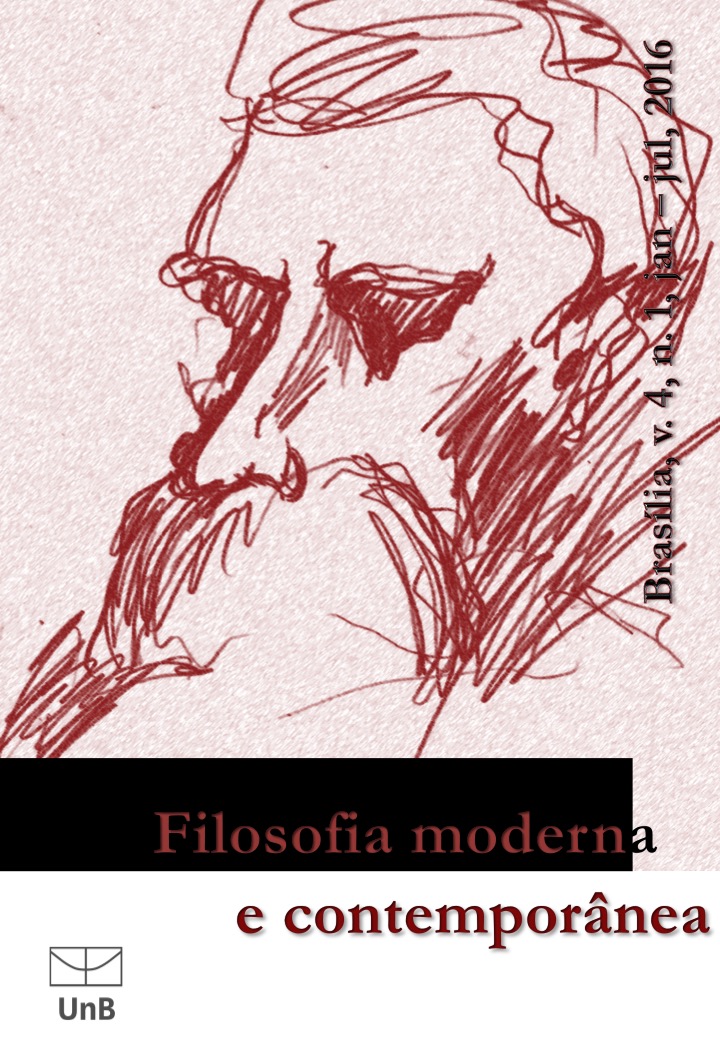Nietzsche contra Schopenhauer? A reavaliação nietzschiana do valor metafísico da música
DOI:
https://doi.org/10.26512/rfmc.v4i1.12529Palabras clave:
Música, Ritmo, Apolíneo, Dionisíaco, WagnerResumen
O presente artigo explora as concepções schopenhaueriana e nietzschiana da música e as suas consequências para a reflexão filosófica de Schopenhauer e Nietzsche acerca desta arte. Começando por identificar algumas contradições na ‘metafísica da música’ de Schopenhauer procura-se, num segundo momento, confrontá-las com as ideias de Nietzsche sobre a importância filosófica desta arte e mostrar em que medida Nietzsche se inspirou e se afastou da estética musical de Schopenhauer. Em particular, procurar-se-á mostrar o modo como Nietzsche retoma e resolve as ambivalências da análise schopenhaueriana das noções de ritmo e plasticidade através das críticas que faz à leitura wagneriana da metafísica schopenhaueriana da música e que contribuem para a sua compreensão não só desta arte, mas também da filosofia.
Descargas
Citas
BARBERA, Sandro, Apollineo e dionisíaco. Alcune fonti non antiche di Nietzsche, Estrato di Linguística e Letteratura XIII-XIV, 1988-1989, Giardini Editori e Stampatori in Pisa.
BARBERA, Sandro, Goethe versus Wagner. Le changement de fonction de l’art dans Choses humaines, trop humaines in D’Iorio, Paolo/Ponton (dir.), Nietzsche. Philosophie de l’esprit libre. Études sur la genèse de Choses humaines, trop humaines, Éditions Rue d’Ulm/Presses de l’École Normale Supérieure, Paris 2004, pp. 37-60.
BARBERA, Sandro, Ein Sinn und unzählige Hieroglyphen: einige Motive von Nietzsches Auseinandersetzung mit Schopenhauer in der Basler Zeit in Borsche, Tilmann/ Gerratana, Federico/Venturelli, Aldo (hrsg.), "Centauren-Geburten": Wissenschaft, Kunst und Philosophie beim jungen Nietzsche, Walter de Gruyter, Berlin/New York 1994, pp. 217-233
BARBERA, Sandro, Une philosophie du conflit. Études sur Schopenhauer, PUF, Paris 2004.
BARBERA, Sandro-CAMPIONI, Giuliano, Il genio tiranno. Ragione e dominio nell’ideologia dell’Ottocento: Wagner, Nietzsche, Renan, Milano, Franco Angeli 1983.
BOOGAARD, Meno, The reinvention of genius. Wagner’s transfigurations os Schopenhauer’s aesthetics in «Beethoven» in Postgraduate Journal of Aesthetics, Vol. 4, Nº 2, August 2007.
DAHLHAUS, Carl, L’idée de la musique absolue, Éditions Contrechamps, Genève 2006 (traduit de l’allemand par Martin Kaltenecker).
DUFOUR, Éric, L’esthétique musicale de Nietzsche, Presses Universitaires du Septentrion, 2005.
GOETHE, J.W., Maximen und Reflexionen. Text der Ausgabe von 1907 mit der Einleitung und den Erläuterungen Max Heckers, Insel Verlag, Frankfurt am Main 1976.
IRIARTE, Rita, Música e Literatura no Romantismo Alemão, Materiais Críticos, Lisboa, 1987.
SCHOPENHAUER, Arthur, Sämtliche Werke, herausgegeben von Wolfgang von Löhneysen, Cotta-Insel Verlag, Stuttgart/Frankfurt am Main 1960-1965 (Band I-V).
WAG N E R , R i ch a r d , Beethoven, Editorial Inquérito, Lisboa, s/d (tradução de Daniel de Sousa).
ZÖLLNER, Günter, “Schopenhauer” inSorgner, S. L./ Birx, H. J./ Knoepfler, N. (Hg.), Wagner und Nietzsche. Kultur ”” Werk ”” W irkung . Ein Handbuch, Rowohlt Taschenbuch Verlag, Reinbek bei Hamburg 2008, pp. 355-372.
Descargas
Publicado
Cómo citar
Número
Sección
Licencia
Los derechos de autor para artículos publicados en esta revista son del autor, con derechos de primera publicación para la revista. Debido a que aparecen en esta revista de acceso público, los artículos son de uso gratuito, con atribuciones propias, en aplicaciones educativas y no comerciales.


